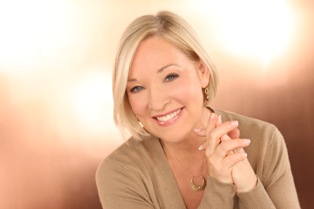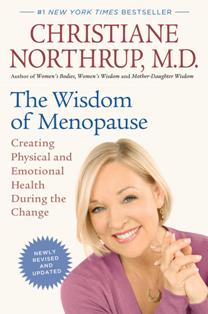Since day one of this body image series, I've been on a mission. I've been searching for those rare women who love their bodies. Whether they've always felt comfortable in their own skin or they've had to work to achieve comfort doesn't matter to me. What really matters is what, exactly, they're doing, thinking and feeling that allows them to feel the love as their body changes with age, illness, stress and life's other inevitabilities.
The first woman I met who can honestly say she loves her body is fat activist Lesley Kinzel. Kinzel started loving her whole 300-pound self after she stopped dieting at age 18. The second woman, a world-renowned physician and bestselling author, came to body acceptance later in life, when she was 55. Even if you've never read one of her bestsellers, you may have heard of her: Dr. Christiane Northrup.
In case you haven't heard, the multi-talented Northrup is a holistic ob/gyn specialist, writer, speaker and mother who has made it her mission to inspire good health in womankind. Or as Northrup so eloquently puts it: "I dedicated the first half of my life studying all that can go wrong with the female body -- and learning how to fix it. I'm devoting the second half of my life to illuminating all that can go right."
When I read about Northrup's hard-won acceptance in Rock What You Got, the body image tome for teens by Katherine Schwarzenegger (yes, Arnold's daughter), I was eager to ask this leading authority in the field of women's health and wellness to share her secrets to success. When I asked, she was only too happy to share.
What follows are questions and answers from that recent phone interview.

Q. You struggled with bad body image until age 55. That's a long time! What started your struggles?
A. I was reading an article in Seventeen magazine that said someone 5'2" should weigh 115 pounds. This was at the time when they called out your weight to the entire gym class. At the age of 13, I was one of the heaviest in the class at 120 or maybe 125 pounds, 10 pounds more than the "ideal." From that moment on, I was in pursuit of seeing 115 on the scale. That single article gave me the perception that I was overweight. That perception lasted more than 40 years. Here's the rub: I was never overweight! I've never been skinny, ever, but I have large bone structure. I was always pretty much where I should be.
Q. In the throes of your body image struggles, you were raising two daughters. That must have made it even more painful to feel so uncomfortable in your own skin. What can you tell me about that time in your life?
A. I didn't feel uncomfortable in my skin, but I always wished I were five to 10 pounds lighter. Unfortunately, I made the mistake of asking my [then] husband what he thought of my weight. I probably weighed 125 pounds at the time. He said: "You could stand to lose five pounds." For 24 years, I was married to a man who never had any problem losing weight. With him, it was an issue of morality. If you were a good, upstanding, moral person, you would just forego dessert, and you'd never have a problem with your weight. So what's wrong with you?
I've always exercised, but the thing that finally made the difference with my body image was coming home to activities that this body loves. I like dancing, yoga and Pilates, but I grew up doing all of these "relentless activities," like skiing and hiking. I always had a tremendous trust in my body and strength, but what was late to arrive was my femininity and sensuality.

Q. What effect did the unfortunate confluence of divorce and menopause have on your self-image?
A. Like so many women, I came to a crossroads -- one place says grow, the other says die. I knew that certain things had to die in my life. I never wanted the divorce to happen, [but it did]. So I decided I needed to become the woman that the kind of man I was interested in would be attracted to. Actually, [I developed] my own inner masculine. That's the part of myself I had to develop. I became that man I wanted to be -- someone sensual and great, like a great surgeon or Barack Obama, someone who is a leader, a consummate host, a king. You don't do this work if you keep thinking: "If the outer world would just give me what I wanted, I wouldn't have to do this." Then what happens, the outer world forces you to do this [the very thing you hope to avoid doing]. That is if, in fact, you're going to take a dose of your own medicine.
Q. How were you finally able to change your bad body image for good?
A. I began to see that it was an act of power to embrace, embellish, adorn and celebrate this temple that is my body. This is where I live. There's no getting around it. I must say, a lot of my body image makeover was put in place by gay men. One big turning point was [preparing to go] on Oprah for the first time. I went to a Boston boutique to get an outfit. The stylist, who was not only welcoming but hilarious, dressed me for my TV appearance with pointy toe stilettos and an elegant designer suit. "Those shoes," I said to him, "are a little witchy." To which he said: "Get over it. That's what's in style. They look fabulous!" Gay men have the ability to see what many of us women can't see. [Like the Provincetown hair] stylist who said to me, "By the way, that hairstyle isn't doing anything for you! What you really need is an A-line bob." Thus was born the hairstyle that works for me.
[Another turning point happened at] Mama Gena's School of Womanly Arts in New York City, where I enrolled my daughters and ended up teaching. I was surrounded by women who were egging each other on to be as beautiful and fabulous as they could be. I saw how all women, when they are turned on to their beauty, no matter what size container it comes in, are instantly healthier and happier.
Q. How do you suggest women learn to love their bodies? Do you have a favorite body image-enhancing exercise you can share?
A. You light candles all around a bathroom with a mirror. A full-length mirror is good, but a hand mirror is fine. In the candlelight, literally admire and caress your skin -- maybe the skin on your throat or the skin over breast. That very act will create a glow in your skin that is luminescent. The act of doing this is very powerful. The first thing that comes up is all the reasons why you're not loveable. When you can finally look at yourself nude in a full-length mirror and say: "I love you. I really love you," then you're at the Ph.D. level.
Q. Anything else you want to say?
A. You know and I know all the research that says the more women's magazines you read, the worse your body image. The magazines are editorially driven by advertisers who want to make money. It's very clear that the way to make money is to make women feel as bad about themselves as possible so they'll buy the product that's supposed to solve the problem. You need to understand the impact of that [advertising] but still bring beauty and fashion into your life.
It's never too late! The body is self-renewing. We turn over every cell in our body within seven years, but you can almost make over completely in three months. It begins with the story you tell yourself in your head. Since we're in our heads and we're kind of captive, it's very important to have a group of people literally egging you on. If you hate your body, chances are good that you're surrounded by other women who also hate their bodies. If you want to change this, you're probably going to have to change a few friends.
---
So concludes the third installment of this body image series. Next up, a Q&A with Tom Cash, the psychologist who developed a proven cognitive therapy program for body image problems. If you want to be sure to catch each and every installment, click the fan button at the top of this page. If you're one of those rare women who loves her body, do leave a comment and/or contact me through my website. This blogger is in search of future profile subjects as well as effective body image programs.
Photo by Charles Bush
Jean Fain is a Harvard Medical School-affiliated psychotherapist specializing in eating issues, and the author of "The Self-Compassion Diet." For more information, see www.jeanfain.com.
For more by Jean Fain, L.I.C.S.W., M.S.W., click here.
For more on body image, click here.